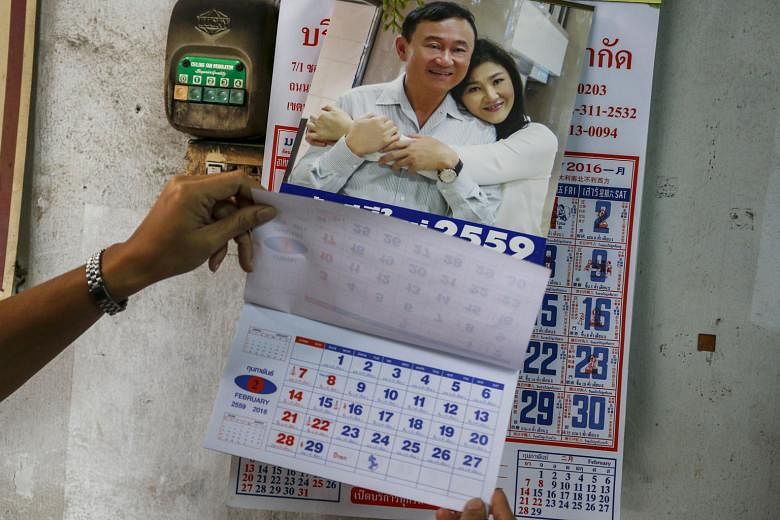Despite restrictions on political activities under Thailand's military government, the Puea Thai party - as well as the powerful Shinawatra clan that features prominently in it - looks set to remain on the country's political scene.
"We believe the Puea Thai party still can get support from our supporters," former premier Yingluck Shinawatra, 48, told The Straits Times in a rare interview yesterday.
Her brother, former premier Thaksin Shinawatra, has reportedly told the party's followers to prepare for elections, in a Chinese New Year message from abroad. Over the new year, he gave away coffeetable books extolling his achievements as prime minister, but calendars featuring him and his sister have been banned from distribution.
The projected date for the polls that have repeatedly been delayed under the military government is now expected some time next year.
Puea Thai and its previous iterations have won every election over more than a decade, triggering pushbacks from the old elites and polarising the kingdom through occasionally violent conflict.
Thaksin, who was in power from 2001, was ousted in a military coup in 2006. The billionaire businessman lives abroad to evade a graft-related jail sentence but retains broad influence in the party.
His brother-in-law Somchai Wongsawat was premier in 2008 but was removed from office by the Constitutional Court after it found his party guilty of electoral fraud.
Ms Yingluck was thrown out of power by the Constitutional Court in May 2014 before her government was unseated by a coup. She was then retroactively impeached by a military-appointed legislature and is banned from politics until 2020.
During seven months of protests that preceded the 2014 coup, critics demanded that her clan exit Thai politics altogether.
Asked about the likelihood of that happening, Ms Yingluck said: "The people who have the final say should be Thai people, the majority of the Thai people."
She would not be drawn into the question of whether she may return to politics after her five-year ban. But the former business executive has noticeably raised her public profile recently - despite being under tight watch by the military government - openly pleading for fairness with regard to her ongoing criminal trial for alleged negligence over her government's rice subsidy scheme. The programme allowed farmers to sell rice to the government at above-market prices and is estimated to have cost 500 billion baht (S$19 billion). While critics have decried the loss of public funds, she maintained that it was a legitimate programme to support Thailand's farmers.
"I tried to keep a low profile for almost two years (to try not to stir conflict). We let the government run the country," she said. "But sometimes we need to speak out because we worry about misunderstandings of the public."
Separately, the military government is looking into how it can claw back from her the compensation for the rice scheme, which some quarters have interpreted as an attempt to make her stay untenable in the country.
But she shrugged off suspicions that she may try to flee, saying: "If I wanted to run away, I would have done so from the beginning. Why would I enter the (court) process?"
Ms Yingluck remains one of Puea Thai's most popular personalities. She is mobbed by supporters whenever she goes to the north or north- east, where Puea Thai draws its support, and has attracted more than four million "likes" on her Facebook page.
But she maintained she is no threat to the ruling junta. "I don't have any (political) position… I am just the mother of a son," she said, referring to her teenage son. "So, don't need to worry about me."
But that looks unlikely to keep a lid on her political views. Thailand, for example, is now mulling over a draft Constitution that promises to keep elected politicians on a tight leash, a prospect which Puea Thai has strongly opposed.
"Politicians come from elections… they are representatives of the people," she said. "If you don't trust the politicians, it means you don't trust the people."

